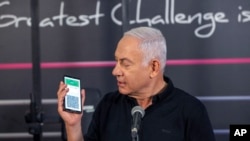When Israel this month holds its fourth election in less than two years, Prime Minister Benjamin Netanyahu will hope goodwill from a world-beating Covid vaccination campaign can finally secure him an elusive majority government.
The last time Israelis went to the polls just a year ago, they delivered a result that had already become familiar: neither the right-wing Netanyahu nor his centrist challenger Benny Gantz had enough support for a parliamentary majority.
The world, and Israeli politics, have since been upended by the pandemic. Just weeks after the last election, Israel entered the first of three coronavirus lockdowns.
In May, Netanyahu, Israel's longest serving premier, and Gantz formed a unity government, declaring that the public health threat required political stability.
But their coalition, which had been set to last three years, collapsed in December when Netanyahu's refusal to approve a 2021 budget forced new elections, to be held on March 23.
Netanyahu, a wily political veteran, is now hoping he can sneak over the line thanks to the inoculation drive.
The 71-year-old also hopes for a boost from having clinched historic normalization deals with four Arab states — the United Arab Emirates, Bahrain, Morocco and Sudan — agreements he claims mark a new era in the Middle East.
But despite Netanyahu's apparent successes, polls point to another indecisive result, with the premier so far lacking a clear path to form a government.
'Vaccine nation'
Israel, a country of about nine million people, has given the two recommended jabs of the Pfizer/BioNTech coronavirus vaccine to around four million residents, an inoculation pace envied by many nations.
Netanyahu has been happy to take the credit for boldly reaching out early to drug-makers with approved vaccines.
"Do you know how many presidents and prime ministers call Pfizer and Moderna? They don't answer. But when it's me, they take the call," he said days ago.
"I convinced them that Israel would be a model country to roll out the vaccine: who else will do that? Definitely not [Yair] Lapid, [Naftali] Bennett and Gideon [Saar]," he proclaimed, referring to his main election challengers.
Israel secured a large vaccine stock from Pfizer because its highly digitised medical system enabled it to offer the company fast, precious data on the product's impact.
Netanyahu has repeatedly visited vaccination centres and adopted the phrase "Vaccine Nation", a play on the "Start-up Nation" tag Israel acquired because of its burgeoning high-tech sector.
But some voters also blame Netanyahu for the painful lockdowns.
His political allies, ultra-Orthodox Jews, have flouted restrictions — often with a muted police response — fuelling transmission while many other citizens were following the rules.
Right-wing pitch
As the vaccine edges Israel out of the pandemic, its political landscape is shifting.
Gantz's supporters punished him for entering a Netanyahu-led government and his fractured Blue and White party may not even get enough votes to qualify for parliament.
Netanyahu's former partner, Yair Lapid of the Yesh Atid party, has emerged as his main challenger, polls show.
And a former prominent member of Netanyahu's Likud, Gideon Saar, has formed his own party to run against the premier.
Seeking to make up any lost ground, Netanyahu has tried to appeal to Arab voters, despite having disparaged them in past campaigns and backing a 2018 law that downgraded Arabic's status as an official language.
For all that has changed since the last election, a single question for voters has again dominated this year's campaign: are you for Netanyahu or against him?
The electorate is "divided between those who want Netanyahu to continue to another term in office and those who hope to see him finally head home", the head of the Israel Democracy Institute think-tank, Yohanan Plesner, told AFP.
Seeking to shore up his right-wing support in the campaign's final days, Netanyahu on Sunday visited Kfar Etzion, a Jewish settlement in the occupied West Bank.
Settlers, who live in communities widely regarded as illegal under international law, are also being courted by Netanyahu’s right-wing rivals, Saar and Bennett.
Netanyahu recalled visiting Kfar Etzion in its early days, some 50 years ago, and lauded the "wonderful pioneering activity" of his audience.
He warned voters that straying from Likud would be a "terrible mistake" that could produce a left-wing government.
"Vote Likud," he told them. "We will create a strong, stable, right wing government.




